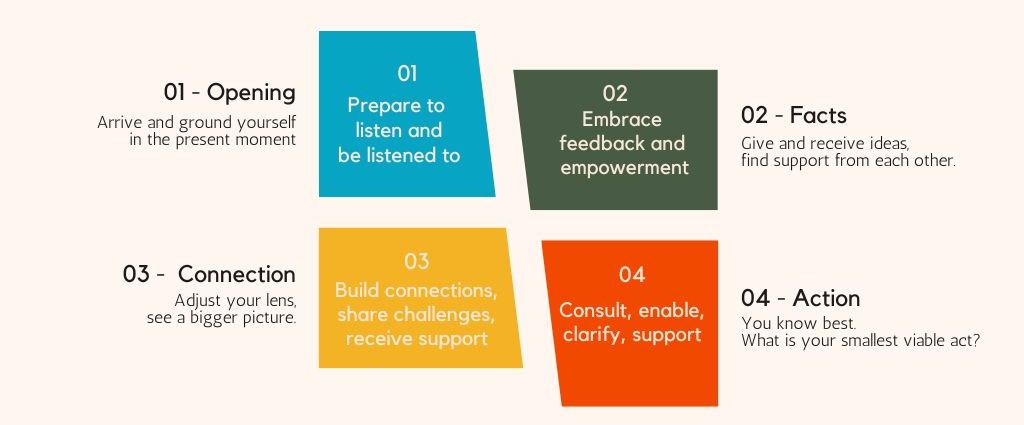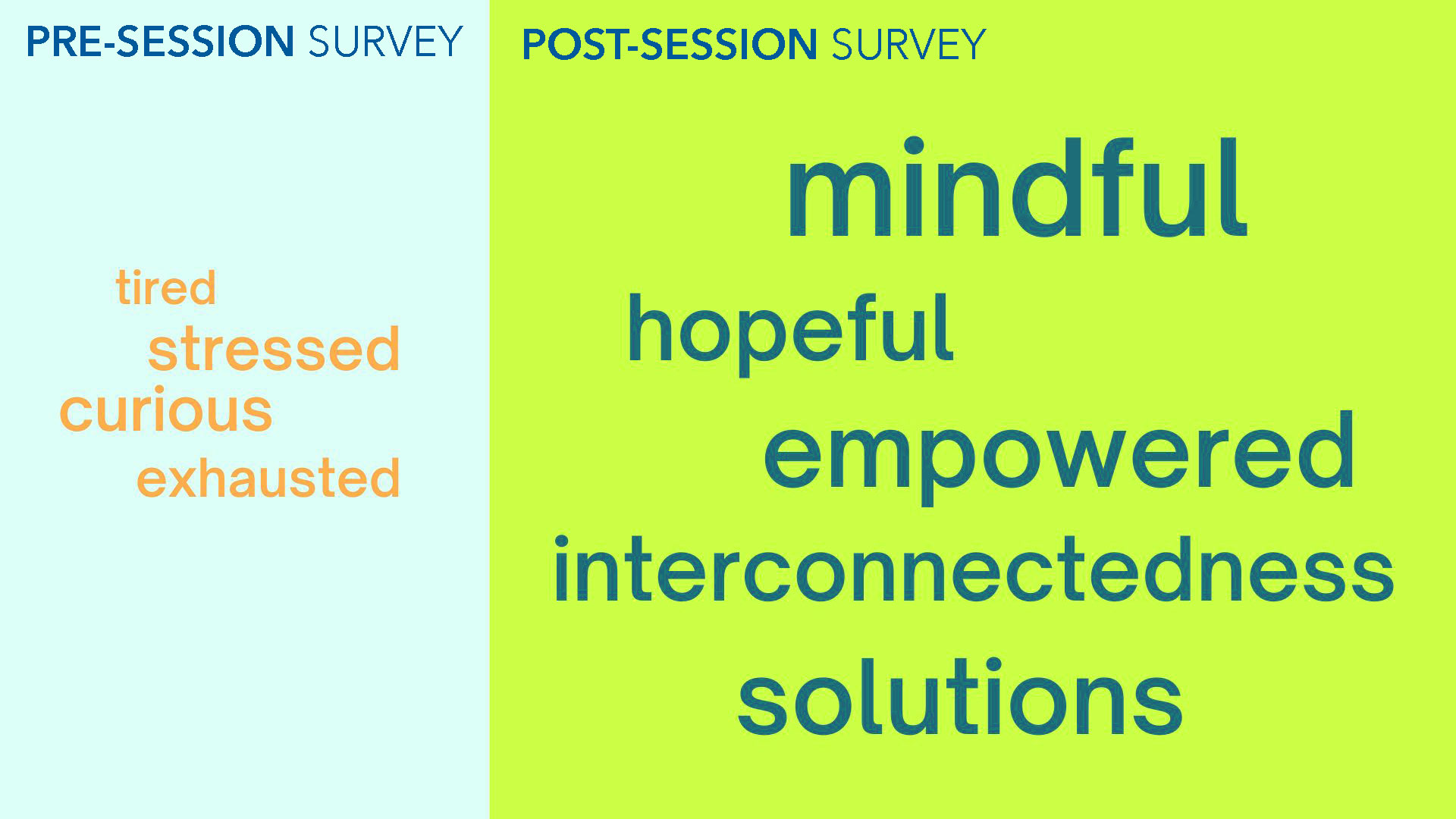Climate Conversations – Facts, Connection, Hope, Action
Participants explored the power of human connection, gained insights, and developed tangible steps to address climate change, co-created to match their specific context.
Background
The Green Committee is an employee-led group within Finance in Motion, an impact investing bank based in Germany. There was a stated need to address the pressing issue of climate change and inspire action within the organization.
The workshop was designed to shift the mindset of doom-and-gloom to one of possibility. It was built to engage participants in an interactive and reflective experience where they explore personal motivations, connect with others, and gain a broader perspective on climate action.
The workshop aimed to equip participants with the knowledge, motivation, and practical steps needed to contribute to creating a more sustainable world.
The workshop was centered around this question: “As someone who works in finance, how can I contribute personally and professionally to creating a more environmentally sustainable world?”
Challenges
The three main challenges were complex and heavy on the soft skills:
- Systems thinking: Climate change is a complex issue that requires a systems thinking approach in order for it to outlast individual contributors. The workshop encouraged participants to think beyond isolated actions and consider the interconnectedness of various factors, such as the impact on future generations, the role of countries and borders, and the well-being of all inhabitants of Earth.
- Overcoming barriers: The workshop addressed barriers such as the fear of not being qualified or the hesitation to take action due to the perceived magnitude of the problem. Participants were encouraged to overcome these barriers by emphasizing that everyone is qualified to act on climate change and that even small actions can make a significant difference. Many individuals may feel overwhelmed or unsure about how they can contribute to addressing climate change. The workshop sought to empower participants and motivate them to take meaningful action by exploring personal motivations and areas where they can make a difference.
- Collaboration and support: Climate change requires collective effort, and the workshop fostered a sense of collaboration and support among participants. Through impromptu connections, conversation cafes, and consultation sessions, participants engaged in dialogue, shared ideas, and received support from others, creating a supportive and collaborative environment.

Actions
During the workshop, a series of actions were taken to engage participants and inspire meaningful contributions to addressing climate change challenges. The workshop flow consisted of the following sections:
- Opening: The session began by allowing participants 5 minutes to arrive and ground themselves in the present moment. The importance of presence was emphasized, along with establishing an agreement based on curiosity, open-mindedness, equal air time for listening and speaking, and being comfortable with not knowing. At the beginning all participants were asked to identify their current emotional state. Participants described feeling tired, stressed, and exhausted.
- Facts: During this segment, participants were introduced to the EarthWork Collective (EWC), a renowned group of experts in transformative change. The collaborative process of creating a book, which included the “page 19 experience,” was highlighted. The page 19 experience symbolized the co-creation and inclusive leadership approach taken by EWC, where multiple authors contributed to the book. Participants discussed the courage it takes to take action and the empowering nature of collective authorship. Various aspects of the page 19 experience, such as working across time zones and embracing feedback, were explored. The importance of empowerment and the notion that everyone is qualified to act on climate change were also emphasized.
- Connection: In this section, participants engaged in impromptu connections, sharing their challenges and receiving ideas and support from others. Reflecting on personal motivations and areas where they wished to make a difference, participants explored their individual connections to climate action. The lens was adjusted to encourage participants to play with the bigger picture, expanding their perspectives and considering climate action from different angles.
- Action: During this segment, participants focused on actionable steps and personal commitments. They contemplated what it means to become a good ancestor and identified their next incremental steps in addressing climate change. The 15% Solution exercise challenged participants to identify the smallest possible actions they could take given their circumstances. They generated their own list of 15% solutions individually, brainstorming practical and feasible actions. Subsequently, participants shared their ideas in groups of three, providing each person with two minutes to discuss their solutions. Consultation sessions followed, enabling participants to offer advice, ask clarifying questions, and provide support to refine their ideas. Each person received dedicated attention for five minutes, fostering a collaborative and supportive environment.
Throughout the workshop, the structured conversations aimed to engage participants, encourage exploration of different perspectives, and inspire tangible actions towards addressing climate change challenges.
Outcome
By the end of the workshop participants were able to draw tangible actions and have some concrete next steps to apply in their own circle of control. The success criteria for the workshop were the following:
- Participants co-created their own next steps during the workshop. This simple action works with their intrinsic motivation to support follow through after the session.
- They brought their own challenges, gave and received advice on possible solutions, will consider the range of the possible action, and decide what is a good fit for them.
- All actions were tangible because the participants formulated them themselves, with the constructive input of others. This allowed them to keep in mind their own personal circumstances and increase the chances of success.

“What shifted because of this workshop?”
The participants of this sustainability workshop resided around the globe from India in the East to Peru in the West. The Green Committee shared that the invite was a huge success for them — almost 30 people registered for the event, coming from diverse teams over the two days of the workshop.
Get Connected
Change happens faster and smoother when we work together. Learn how EarthWork help your organization connect, co-create, and execute on shared goals.
